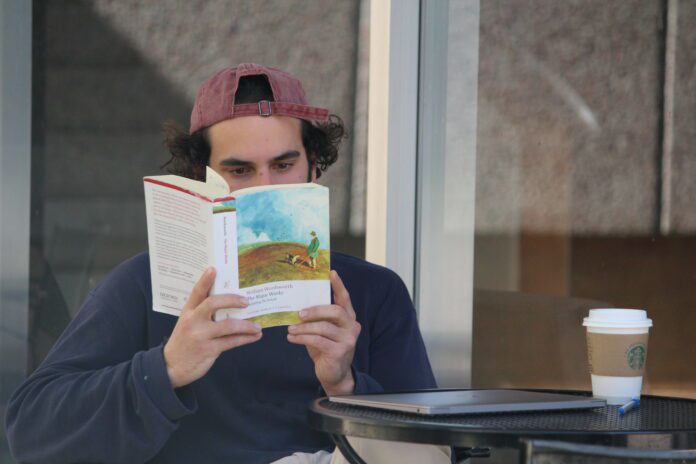A reflection on poetry and prayer
Disclaimer:
All articles published within this section of The Cor Chronicle are the opinions of the respective authors and do not necessarily reflect the opinions of The Cor Chronicle.
It’s J-Po Season! The time of year that all junior English majors present to a panel of professors everything they have discovered about the poet they chose back in the summer and have been reading and studying since. If you enjoy lingering around Braniff, you might just see some of these juniors enter the depths of the library looking sleep-deprived and anxiety-ridden. And if you keep watching, you will surely see them reemerge with a glow of confidence and relief that only abides in a heart which has proven its own brilliance by giving way to the brilliance of another.
This is the beauty of J-Po—suddenly realizing that your mind has been so steeped in the words of another, that you have begun to think thoroughly alongside him or her, and can give a unique voice to the words they have left behind.
However, this is not a joy reserved simply for junior English majors. We all have a uniquely human ability to allow the words of another to inhabit our heart. Often times we memorize things for the sake of an exam or performance, but then they fade from our memory with time.
There seems to be a fundamental difference between memorizing something in this way and learning to know something by heart.
There is some mysterious way in which one can encounter words, and specifically poetry, that allows for it to really enter the heart and be appropriated into the person. When this happens, it becomes very clear that you are encountering another; the recitation of a poem known by heart puts you into communication with not only the poet, but every other person who has ever put sound to its lines.
Committing something to memory in such a way that you know it by heart gives way to a deep freedom that I am sure the current J-Po students can attest to (or at least will be able to attest to when it is all said and done). When you take someone else’s words into your heart, it becomes possible for them to surface as your own.
After having been through my own J-Po semester, I find that often a movement of my heart will simply bring the words of a poem to my mind and allow me to express a thought or feeling perfectly, instantly connecting me to the whole history of thought and feeling tied to the writing and repeating of that same line for as long as it has existed.
This idea becomes deeply profound when applied to prayer. In “Sacrosanctum Concilium,” the Church tells us that Christ “introduced into this earthly exile that hymn which is sung throughout all ages in the halls of heaven.” He draws all to Himself “with His own singing of this canticle of divine praise.”
These lines refer to the Divine Office: the Church’s constant recitation of the song of the Divine Poet back to Him. The Liturgy of the Hours stems from the practice of the medieval monks who would memorize the psalms in order to pray them constantly throughout their day. They knew these Scriptural poems by heart because they had encountered in them the Divine Persons who authored them.
When a member of the faithful prays the Divine Office, they partake in that constant singing of the Church which was initiated by Christ and continues through all eternity.
The poet himself gives a new voice to the divine song as he captures moments of his created existence in poems. The J-Po student then participates in this communion of creation and recreation by taking words into his heart and reciting them anew.
Ultimately, we cannot make anything truly new; we only participate in what has already been created. However, the beauty we imitate, either by writing or reciting poetry, multiplies and becomes new in some sense when it is taken into our hearts; we are made more by its presence and it is made more by our voice.
I think my poet, Richard Wilbur, provides a beautiful image to think of this process of conformation and transformation when he writes, “The beautiful changes and a forest is changed / by a chameleon’s tuning his skin to it.”
So, make sure to congratulate your J-Po friends this week and next because they have truly accomplished something beautiful. And more importantly, if you don’t have anything memorized by heart, ask them what poem you should start with.

